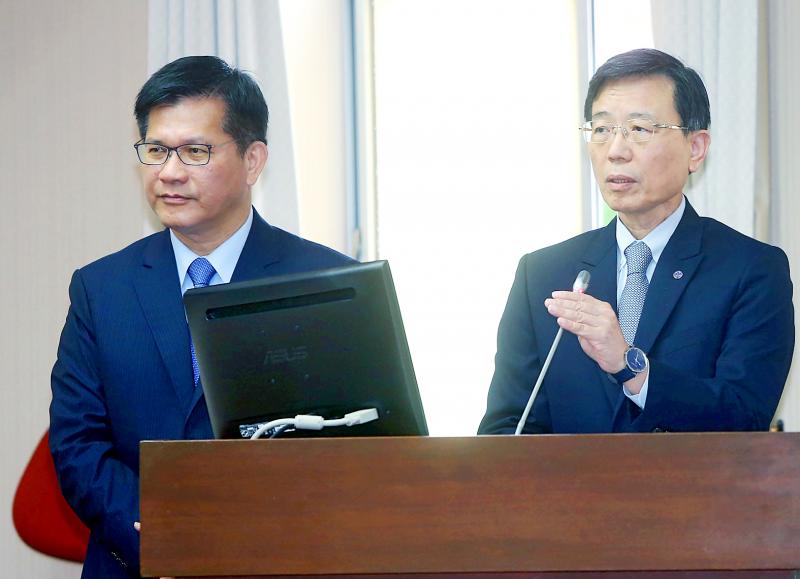A task force has been formed to investigate why the Taiwan Railways Administration (TRA) failed to follow standard procedures after damaged rails were discovered in Taichung in May, Minister of Transportation and Communications Lin Chia-lung (林佳龍) said yesterday.
New Power Party Legislator Chen Jiau-hua (陳椒華) on Wednesday told a meeting of the legislature’s Transportation Committee that inspectors on May 19 reported a 44cm crack in a rail after a commuter train had passed the section south of Chenggong Station (成功) in Wuri District (烏日).
However, the TRA did not close the section to replace the damaged rail and two express trains operated on the section that day, Chen said.

Photo: CNA
Moreover, inspectors in March had reported cracks in rails in the section, which should have prompted immediate action, she said.
Since 2018 the TRA has reported nine instances of broken or cracked rails, she said.
An inspection car that it uses has been operating for 40 years and a new one that it bought five years ago has not taken over, as it does not meet TRA standards, Chen said.
Lin yesterday said that he only learned of the May 19 reports at a TRA safety briefing on Monday, two days before the second anniversary of the derailment of a Puyuma Express in Yilan County on Oct. 21, 2018, which killed 18 people and injured 291.
Lawmakers yesterday asked why it took five months for Lin to be briefed about an incident as major as cracked rails and why the TRA failed to replace the damaged section when it was first reported in March.
TRA Director-General Chang Cheng-yuan (張政源) said that the agency launched an internal investigation after the May 19 report revealed the lapse.
The personnel found to be responsible have been held accountable, and the results of the investigation were reported to the Taiwan Transportation Safety Board and the ministry, Chang said.
Cracks in rails are categorized as “abnormalities in rail operations” and not major incidents, so the TRA was only required to report the incident to the ministry and the board, but that information would not normally reach the minister, he said.
When a crack was found on March 3, the director of maintenance for the section fastened it with a fishplate, Chang said.
The maintenance director was supposed to direct that the section be closed and the rail replaced — which is standard operating procedure — but he failed to do so, so the cracked rail remained in place until the May 19 reports, Chang said.
Asked why TRA personnel reported a crack of 3cm to 4cm when it was a 44cm crack, Chang said that Chenggong Station staff asked maintenance personnel to report their findings, but the person who received a radio message describing the situation misheard the number.
“Even though the incident did not result in an accident, TRA management needs to be more alert,” Lin said. “It is negligence that damaged rail was found in March, but was not replaced until May.”
“Moreover, even though station personnel told dispatchers about the broken rail, two trains were allowed to access the section,” Lin said, adding that the procedures in such incidents need to be comprehensively reviewed.

The inspection equipment and data transmission system for new robotic dogs that Taipei is planning to use for sidewalk patrols were developed by a Taiwanese company, the city’s New Construction Office said today, dismissing concerns that the China-made robots could pose a security risk. The city is bringing in smart robotic dogs to help with sidewalk inspections, Taipei Deputy Mayor Lee Ssu-chuan (李四川) said on Facebook. Equipped with a panoramic surveillance system, the robots would be able to automatically flag problems and easily navigate narrow sidewalks, making inspections faster and more accurate, Lee said. By collecting more accurate data, they would help Taipei

TAKING STOCK: The USMC is rebuilding a once-abandoned airfield in Palau to support large-scale ground operations as China’s missile range grows, Naval News reported The US Marine Corps (USMC) is considering new sites for stockpiling equipment in the West Pacific to harden military supply chains and enhance mobility across the Indo-Pacific region, US-based Naval News reported on Saturday. The proposed sites in Palau — one of Taiwan’s diplomatic allies — and Australia would enable a “rapid standup of stored equipment within a year” of the program’s approval, the report said, citing documents published by the USMC last month. In Palau, the service is rebuilding a formerly abandoned World War II-era airfield and establishing ancillary structures to support large-scale ground operations “as China’s missile range and magazine

A 72-year-old man in Kaohsiung was sentenced to 40 days in jail after he was found having sex with a 67-year-old woman under a slide in a public park on Sunday afternoon. At 3pm on Sunday, a mother surnamed Liang (梁) was with her child at a neighborhood park when they found the man, surnamed Tsai (蔡), and woman, surnamed Huang (黃), underneath the slide. Liang took her child away from the scene, took photographs of the two and called the police, who arrived and arrested the couple. During questioning, Tsai told police that he had met Huang that day and offered to

A British man was arrested for attempting to smuggle 14.37kg of marijuana into Taiwan through Taiwan Taoyuan International Airport, Taipei Customs said late yesterday. The man, who arrived from Bangkok at 9pm on Friday, was asked by customs officers to open his luggage during a random inspection, Taipei Customs said in a news release. The passenger, whose identity was not disclosed, refused to open his suitcase and tried to flee the restricted area. He was eventually subdued by three customs officials and an Aviation Police Bureau officer. A later search of his checked luggage uncovered 14.37kg of marijuana buds. The case was handed over